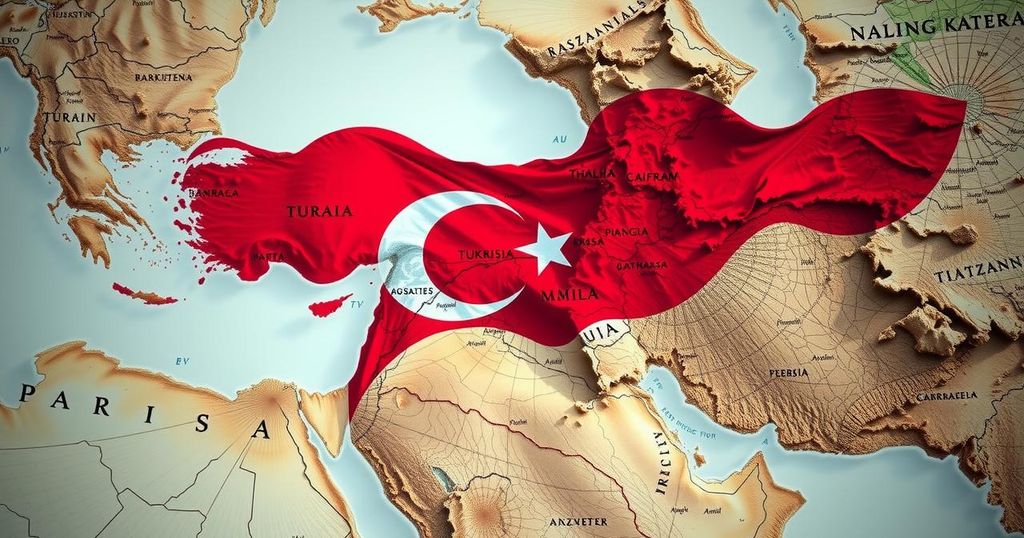Turkey’s influence in the Middle East is surging as the Assad regime’s decline diminishes Iran’s power, marking a shift from the “Shia crescent” to Turkey’s rising “full moon”. President Erdoğan’s support for Syrian rebels has enhanced Turkey’s status as a regional powerhouse. As Iran’s presence wanes, Turkey is asserting its influence in Iraq, Africa, and beyond, challenging established powers like Saudi Arabia and redefining the regional landscape.
The geopolitical balance in the Middle East is undergoing a significant shift, heralded by Turkey’s growing influence, often referred to as its “full moon” phase. The decline of the Assad regime in Syria represents the end of Iran’s anticipated dominance characterized by the “Shia crescent” and an ascendance of Turkey as a formidable regional player. President Recep Tayyip Erdoğan’s steadfast support for Syrian rebels has solidified Turkey’s stature and enabled its extensive reach across the region.
Turkey’s involvement was essential in the rebels’ unexpected successes, distinguished by a lack of the extensive destruction typical of past conflicts in Syria. With the provision of crucial intelligence, leadership, and global goodwill, Turkey’s backing fortified the rebels in northwestern Syria, creating a conducive environment for their rearmament and tactical reorganization since 2019 amidst a backdrop of perpetual ceasefires.
As Iran finds itself strained due to Israeli military actions against its forces and Hezbollah, the eventual downfall of Assad’s regime transitioned from a distant possibility to an unavoidable reality. Concurrently, Russia’s focus on its military operations in Ukraine significantly limited its aid to Assad, further weakening his position.
Turkey’s growing prowess also has implications for Iraq’s political landscape, where the emergence of a Sunni-led government in Syria diminishes Iran’s long-standing influence over predominantly Sunni regions in Iraq. Historically aligned with Kurdish factions against the Kurdistan Workers’ Party (PKK) in northern Iraq, Turkey’s strengthened position enables it to gain a foothold in the ongoing Sunni-Shia power dynamics that have pervaded the region.
Beyond its immediate neighborhood, Turkey’s geopolitical ambitions stretch across Africa, the Caucasus, and Central Asia. Following the Syrian rebels’ victory, Erdoğan successfully brokered a peace agreement between Ethiopia and Somalia, highlighting Turkey’s role as a mediator among its allies. Furthermore, Turkey’s military involvement in Libya reinforces its stake in Mediterranean energy geopolitics, positioning it as a central actor in North Africa.
Turkey’s influence has similarly expanded in Afghanistan, where it has developed relations with the Taliban following their return to power in 2021. Additionally, Ankara’s support of Azerbaijan during the Nagorno-Karabakh conflict against Armenia has entrenched its strategic presence near Iran.
This emergence of Turkey poses a substantial challenge for Saudi Arabia and its allies. Unlike Iran’s overt sectarian identity, Turkey’s Sunni approach subtly threatens Saudi Arabia’s self-appointed leadership within the Sunni Muslim world. Turkish policies resonate with a diverse array of Sunni Muslims, thereby challenging Riyadh’s narrative of regional supremacy.
Moreover, Turkey’s influence is legitimatized not through proxies like Iran, but rather through its direct support of local Sunni forces and backing popular movements. This distinct strategy positions Turkey as a proponent of a broader Sunni identity, which undermines Saudi Arabia’s historical claims to leadership in the region.
For over two decades, Iran has sought to expand its reach through its “Shia crescent,” which spanned Tehran to the Mediterranean, showcasing its influence over key Arab capitals. However, the rise of Turkey amidst the fragmentation of the iranian crescent indicates a significant realignment in the dynamics of regional influence.
This shifting landscape illustrates that Syria has transitioned from being an ally of Iran to now supporting Turkish interests. Under increasing pressure from home and from Israeli operations, Hezbollah finds its hold in Lebanon weakening, thereby illustrating Turkey’s growing sway over the entire region.
Turkey’s ascent is driven by its robust foreign policy, which addresses both economic and security concerns, contrasting sharply with Iran’s reliance on sectarianism and hard power. Turkey’s multi-faceted strategy enables it to engage with various groups across sectarian and ideological divides within the region.
The implications of Turkey’s rise are profound, instilling apprehension amongst regional powers such as Saudi Arabia, the UAE, and Israel, as it could redefine their geopolitical strategies. Western perspectives on Turkey’s emerging assertiveness are varied, revealing a complex interplay of concerns regarding its Islamist associations alongside a recognition of its pivotal role in Middle Eastern affairs.
Consequently, future regional power struggles are less likely to center on Iran’s ambitions but rather on Turkey’s emerging influence. For allies and adversaries alike, the critical question will no longer concern if Turkey will reshape the Middle Eastern order, but rather how that transformation will occur.
The Middle East has long been a battleground for competing influences, particularly between Iran and Turkey. Iran has historically aimed to bolster its influence through a network of proxy groups, establishing what has been termed the “Shia crescent”. This strategic corridor enabled Iran to project power throughout the region. However, the recent developments in Syria, marked by Turkey’s assertive involvement in the civil war and support for opposition groups, signal a shift in regional dynamics. With Iran’s influence waning due to adversity in Syria and Iraq, Turkey is seizing the opportunity, reshaping alliances and strengthening its role as a regional power. This change bears significant implications for other key players, including Saudi Arabia and Israel, thereby transforming the landscape of Middle Eastern politics.
In summary, Turkey’s rising influence in the Middle East marks a pivotal change in regional power dynamics, particularly following the decline of the Assad regime in Syria. This rise presents a multifaceted challenge to traditional power brokers, especially Saudi Arabia, as Turkey establishes itself as a proponent of a Sunni identity and a legitimate actor in regional politics. The ongoing adjustments will likely redefine not only Turkey’s role but also the broader interactions among competing powers in the approaching years, shifting the narrative from Iranian dominance to a reimagined geopolitical landscape centered around Turkey’s ascent.
Original Source: www.theguardian.com







